“I dreamt about being released from captivity.” A police officer from Mariupol about faith and humor even in hell
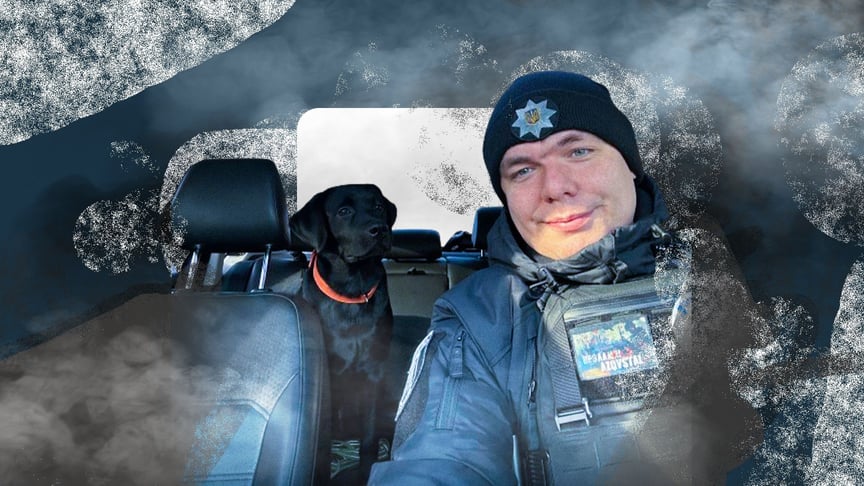
Borys's story made my heart sink. His phenomenon, however, is that after all the horrors he has experienced, he radiates a constant positivity.
Police service during the bombing in Mariupol, a deadly breakthrough to Azovstal, captivity, and more than 9 months of hell — first in Olenivka, then in a Russian prison. And you look at this 31-year-old bright-eyed guy and wonder how, a year after the exchange, with a lot of health consequences, he easily makes jokes and above all does not want to look like a victim.
“Everyone knows about the inhuman treatment of our prisoners by the Russians. But when I imagine someone hearing this from my mouth and starting to feel sorry for me, I get disgusted. I am a warrior and I have to walk this path with dignity.”
About how he joined the Azov unit as a student and then the police; about the “safari” of Russians during the breakthrough to Azovstal; about a legend for his mother; about his faith in seagulls, baklava, and Erdogan; about interrogations and the brilliant green his friend hid for him in his cell; about the first time he learned the Lord's Prayer; and about dreams in captivity that eventually came true. We talk about all this with Borys Kolesnikov, a defender of Mariupol and now a patrol policeman in Lviv.
A student who became an Azov fighter
When Mariupol was first occupied by pro-Russian militants in 2014, Borys was 20 years old. He was young, but already had a clear position: he was a member of the football ultras, which were a kind of center of patriotic youth. When the militants captured Mariupol in the spring, the boys became guerrillas: they collected information about the enemies and reported it to the security authorities.
In June, the Ukrainian Defense Forces recaptured the city. And in the fall, students from the fan community decided to join Azov, a special forces battalion under the Ministry of Internal Affairs.
“The motivation was simple — to defend our country. It was the time of the Ilovaisk cauldron… Azov unit was chosen primarily for its ideology. Our entire ‘gang’ was in one platoon. Unfortunately, not all of us survived.”
The boy who had never held a gun before underwent accelerated basic training. Back then, there was neither time nor sufficient resources.“Everyone remembers 2014: in flip-flops, jeans, and with a machine gun,” Borys recalls. He adds that training is always ongoing at Azov.
Then it was on to the battlefield. Marinka, Hranitne, Shyrokyne in Donetsk region. The latter was the hardest during the offensive. That was the first time, Borys says, that he experienced artillery fire.
In total, the man served almost 3 years.
“You know it's f*cked up, but as a romantic, you believe in the best”
Borys Kolesnikov met the full-scale invasion in Mariupol as a policeman in the ranks of a newly formed combined unit. During the chaos and shelling, they tried to fulfill their duties: maintain public order, prevent looting, be the military's “eyes” in tracking down Russian sabotage and reconnaissance groups, and evacuate the wounded. It was a miracle to survive.
“There were hits every day. I remember that my partner, Serhii Mykhailovych, and I went to get diesel fuel from a barrel to refuel the car. Suddenly we heard a whistling sound… It was a hit by Grad MLRS shell. The fence saved us.”
Grad MLRS was used to hit crowds of people. Even when many civilians gathered near the office of one of the operators, where it was still possible to catch the reception. My partner and I were saved by an armored car — we managed to pick up the seriously wounded and take them to the hospital, which was still working at the time.Borys Kolesnikov, police officer and defender of Mariupol
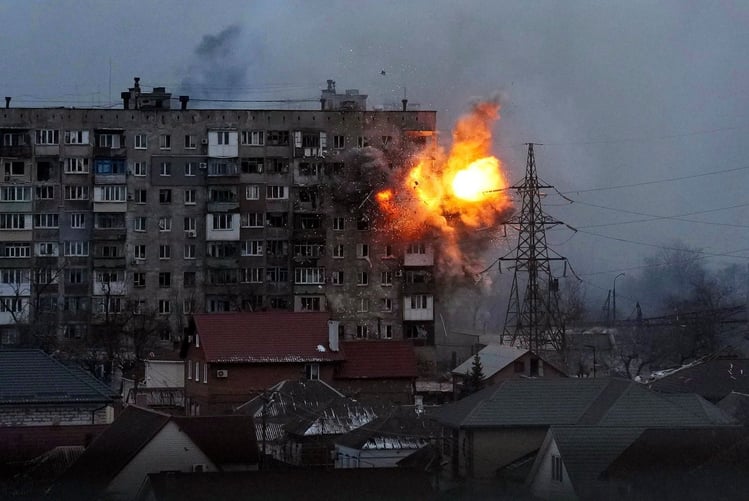
“But even when three districts were already occupied, we supported people and said, ‘Everything will be fine, we will survive.’ The Russians were already 2-3 kilometers away, and we were driving around and patrolling the city.
Well, not the city. There was actually only Prymorskyi district left… You seem to understand that it's f*cked up. And as a romantic, you believe that now we will get together and push them back.”
Although, as Borys admits, the worst thing was seeing many civilian corpses in the city and Graves in the yards. They advised people to make a sign or at least write on a sheet of paper who was buried there.
A legend for his mother
In Mariupol, there is nothing left but memories. Borys's apartment was hit directly. When his mother came to the house to pick up some things, a neighbor stopped her and told her to run away from there.
Borys's mother, Maryna, is a nurse. So she tried to be useful around her son.
“My mom was with us in the Prymorskyi district until the end. She put on a helmet and a bulletproof vest and ran between buildings under fire. She helped the wounded, gave injections, and bandaged them. But when I realized we were going to Azovstal, I didn't take her with us. I told her to go to the hospital.”
Together, they invented a legend for the occupiers: that she was hiding in the Prymorsky district at her relatives' place, and when the shelling stopped, she came to work. It worked. For about a month, she had to work under Russian rule, live in a hospital, and shudder at every bomb dropped on Azovstal. She knew her son had to be there.
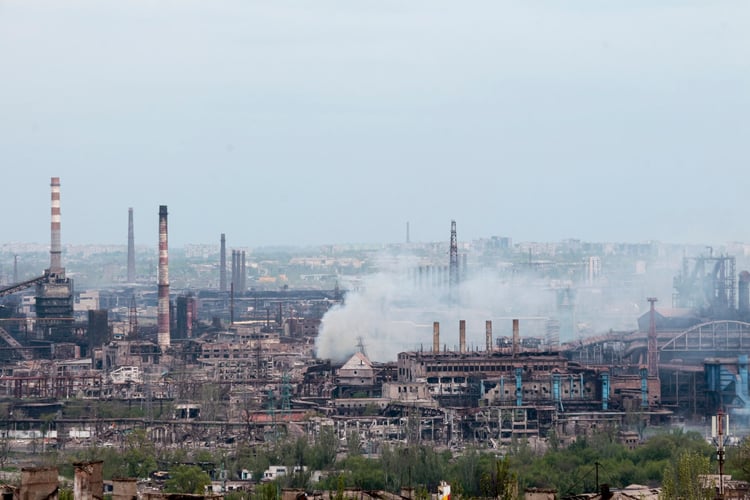
“It was like a shooting range, a kind of ‘safari’ — everything was flying at us”
Borys Kolesnikov describes the breakthrough to Azovstal as the hardest thing he has ever experienced in his life. Being surrounded, he drove about 12 kilometers through the occupied city to the plant. They were moving in a convoy. Borys and his partner were in a passenger car.
“It was like a shooting range, a kind of ‘safari’ — everything was flying at us. Although in the Azovstal area, I was lucky enough to cross the bridge before the Russians destroyed it. Those who weren't so lucky were crossing on whatever they could: some on pallets, some diving in and never coming out… It was chaos.”
Many of our guys were killed during this crossing. It was the hardest thing I've ever seen in my life. I was sure that I would stay there.Borys Kolesnikov, police officer and defender of Mariupol
“I parked the car near the plant. It was cut up in pieces like a sieve. Then, under the constant whistling and flying, I ran under the fence. And then someone from the Azov unit picked me up in a truck, and we got to the territory of the plant itself.
I ran into the shop where there were a lot of guys. I pressed myself against a machine and just hoped that the concrete roof wouldn't fall on us from the bombing. I must have been sitting there for about 5 hours.”
Staying strong at Azovstal: Faith in seagulls, baklava, and Erdogan
Borys Kolesnikov joined the defense of Azovstal in mid-April. At first, the police provided security for the Dzherelo bunker to prevent enemy subversive groups from getting in, as there were many “holes” in the plant. Then they took up combat positions alongside the military, as their forces were not enough to defend the plant. There were hundreds of wounded.
I ask him if, he, as an inveterate romantic, had a moment of complete despair at Azovstal.
“No, no, there was no such thing,” Borys immediately replies.
We always believed in something. When we were resting from fighting, we used to say: ‘Erdogan will come and take us to Turkey.’ We even chose a five-star hotel in the bunker.Borys Kolesnikov, police officer and defender of Mariupol
“Or there was 'plan B': to go to the beach in shorts and sell baklava like the locals. Although we would have been given away by our tattoos,” helaughs. “For Russians, any Ukrainian tattoo means ‘Azov’.
We also thought about building a raft out of bottles and sailing to Turkey — we even looked at a map...
Or to fly on seagulls… To lure a lot of seagulls so that they would pick us up and fly us to Zaporizhzhia. But the problem was that there was nothing to lure the seagulls with — there was no bread.”
The bombardment shakes the entire bunker on the minus-seventh floor. You realize that in three more days, you'll be f*cked. Meanwhile, my friend and I are talking: ‘Sh*t, baklava is actually a good idea.’Borys Kolesnikov, police officer and defender of Mariupol
“We really fought beyond the limits of human capabilities,” Borys adds seriously, “We fought like those 300 Spartans, against all the scum that was thrown at us to destroy us. The Russians washed with their blood for Mariupol.”
“I used to call captivity the ‘three D's’: diarrhea, dystrophy, and depression”
Captivity was not an option for Borys: he says he would rather shoot himself. However, his pride prevailed over his high confidence in the command.
After leaving Azovstal on May 16, Ukrainian prisoners were bused almost 100 kilometers away to a small, ruined, and abandoned prison in Olenivka, Donetsk region, which the occupiers had opened the day before. More than 2,500 Ukrainian soldiers were housed in five barracks.
Azov fighters wereseparated from the rest. According to Borys, the Russians have a particularly inhuman attitude towards them. There was a separate building for interrogation and torture — a disciplinary isolation ward.
The five of us slept on one bunk. There was neither normal water nor sewage treatment systems. The technical water was better than the so-called drinking water. It was poured into a barrel near each barrack from a fire truck. It was probably taken from some pond. There was rust and sand, reeds floating there.Borys Kolesnikov, police officer and defender of Mariupol
“There were also ‘shchi’ — they called it water with cabbage. They gave us some kind of porridge three times a day. They threw a small scoop as if for a dog.
There was not enough bread for everyone. I don't know how it was baked — it was raw as if it were just live yeast. Everyone had a severe eating disorder. To get at least something useful, we came up with the idea of brewing tea from cherry twigs: it was tasteless and bitter, but at least something for the body.
I called this captivity the ‘three D's’: diarrhea, dystrophy, and depression. My sense of humor did not disappear even there.”
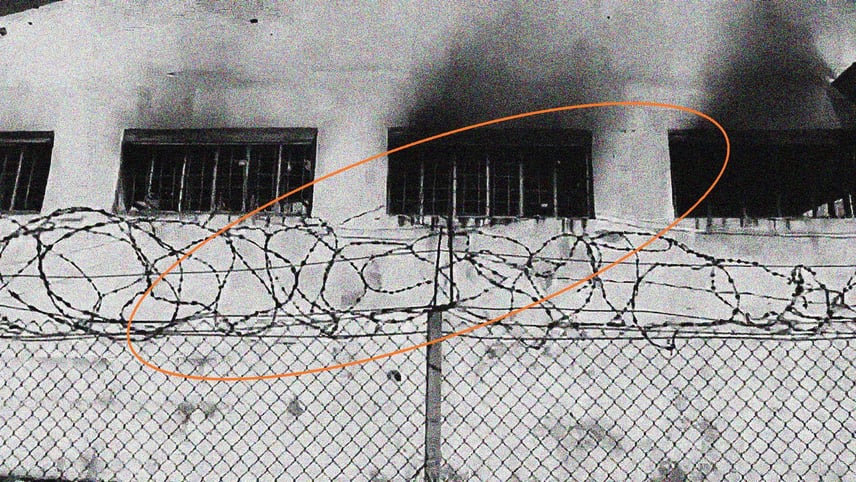
Every day in captivity was the same: getting up at 6 a.m., inspection, singing the Russian national anthem, lunch, dinner, and inspection again. During the inspection, the prisoners had to sit on their hands and knees until the overseers had gone through five barracks. In particular, when a high-ranking Russian overseer arrived. Hands behind your back, back straight, head bent, you can't change the position of your legs, even though they are numb.
Borys stayed in Olenivka for almost six months. At the end of September, everyone in their barracks was told to pack their belongings. The guys were sure it was an “all-for-all” exchange. They started preparing: some shaved, some washed their clothes, some put on fresh underwear with the National Guard emblem, some brewed a hidden bag of vanilla tea for five of them: tomorrow is a holiday, there will be an exchange, journalists with cameras!
On October 1, they were thrown like potatoes with bags over their heads into a tightly packed KAMAZ truck, then loaded onto a plane and from there into a prisoner transport vehicle. On the way, it became clear: “There will be no exchange”.
“I hid the brilliant green: I knew they would bring him in covered in blood”
Instead of the long-awaited exchange, the prisoners were facing a new circle of hell in a Russian detention center. The hardest part was the so-called reception — any of the prisoners will confirm this, says Borys. The Ukrainian prisoners were stripped of their clothes, given a prison uniform, and taken to a cell. They asked who had tattoos.
From then on, Olenivka would seem like a vacation for him, because the Russians identified Borys as an Azov fighter.
They are f*cking crazy. Everything is Azov for them. They are so afraid of it that they have nightmares about it. They identified several of my tattoos as ‘Nazi’ and our trident as a swastika. The interrogations started the next day.Borys Kolesnikov, police officer and defender of Mariupol
He was only lucky in one way: the Russians did not have a photo of Borys's military contract with Azov for 2014-2016. During interrogations, he denied everything.
“I said: ‘There is some kind of mistake, I did not serve anywhere.’ They were trying to get me to testify, so that I would turn someone in. That's how they created the cases of our guys to try them later.”
Borys does not want to talk about the torture of prisoners of war. He only says that they were real sadists. It was also difficult because their cell was right above the interrogation room.
There were twelve prisoners in a cell designed for six. From six in the morning to ten at night, everyone had to stand. Borys's friend and cellmate, National Guard officer Ivan Mikula, recalls that beatings with sticks and stun guns were commonplace.
“Because I was wounded, at least they gave me brilliant green. I hid it under my pillow and tampons behind the radiator so they wouldn't see it. I knew that Boria would be brought back from interrogation covered in blood. It was a standard situation once a week,” Ivan says.
Some people's wounds were simply rotting, and no one provided any help. Do you know what someone was told at the medical center about a head injury covered in blood? They put PVA glue on it and said: ‘It will heal’.Ivan Mikula, National Guard member and defender of Mariupol
“4:2”
Once again, the same imagination and sense of humor kept Borys going in prison.
“Ivan and I would mentally go to shopping malls, buy cars, start businesses, buy houses in the village, and raise chickens.
We calculated how much we could sell a dozen eggs for and how much it costs to feed a chicken for a month. We wondered if it was profitable and if it was, how many chickens would we need? When we counted 1,000 chickens, we realized that we couldn't take it,” Borys says, laughing.
He is smiling now, but more than a year ago, exhausted in the torture chambers of the prison, he turned to God: “Lord, I can't take it anymore, give me some hope or a sign — when will this end?” And he had a dream.
“I was at a football game in Kharkiv. I don't know how, but in my dream,. I knew it was Kharkiv. When someone scored a goal, I saw the electronic scoreboard: the score was 4-2.
I didn't understand what 4:2 was. 2024? Why football? Maybe we'll be exchanged for the World Cup? And we were all wondering when that championship was.”
Only a few weeks after his return, his friend Ivan would recall the dream, and Borys would be shocked. After all, the long-awaited exchange took place on February 4, and it was “4:2”.
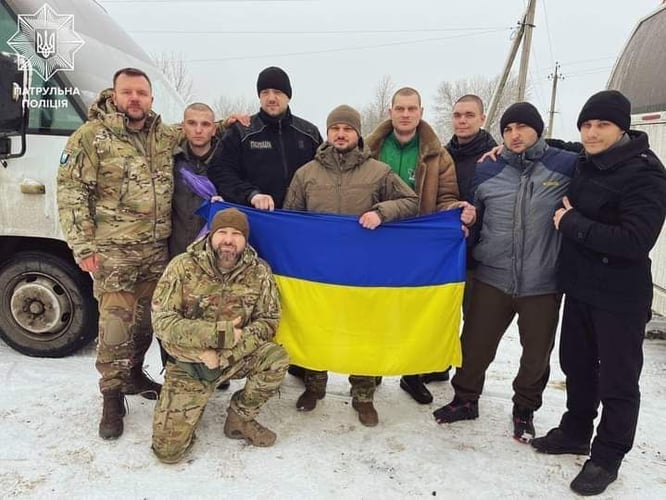
However, Ivan Mikula was exchanged a little later — on February 16. After captivity, they were unrecognizable: the strong men had lost more than 20 kilograms. Borys lost almost a third of his weight: he was 182 cm tall and weighed 90 kg, but returned weighing 65 kg.
Borys waves away the health consequences, which are many: “Everything is fine. The native land heals.”
Flowers for mom
Another time in prison, Borys dreamed that he was released from captivity, bought a black Labrador, and named it Prianyk.
“I was released from captivity, and now I have a black Labrador named Prianyk. He just turned 9 months old the other day.”
Today, he is trying to realize everything he planned in Russian exile when his dream was to at least cook. He bought a grill and a slow cooker and tried oysters for the first time in his life. Step by step, the man crosses out the things from the bucket list he made in captivity.
Every Sunday, if he can, he tries to go to church. He chose a symbolic one — Saints Borys and Hlib Church. Even though Kolesnikov was not a believer before his captivity.
“In captivity, you have to believe in something. There is no other way. Once my friend’s wife wrote a letter to him that contained a prayer. I asked: ‘Fedia, what are you doing?’ And he said: ‘I'm praying before going to bed.’ For some reason, I decided to do the same. For the first time in my life, I memorized eight lines of the Lord's Prayer, and it really made me feel better.”
Borys and his mother now live and work in Lviv. His mother was taken out of the occupation while her son was still in Olenivka. Miraculously, he found a phone in captivity and called the volunteers. A few days later he received a text message: “Call your mom, she is on the government-controlled territory.” On August 9, her birthday, he was even able to order flowers for her from prison. And he dictated a note: “Happy birthday, Mom. I'm not by your side, but I'll be back soon”.
The next time he called his mother was on the day of the exchange.
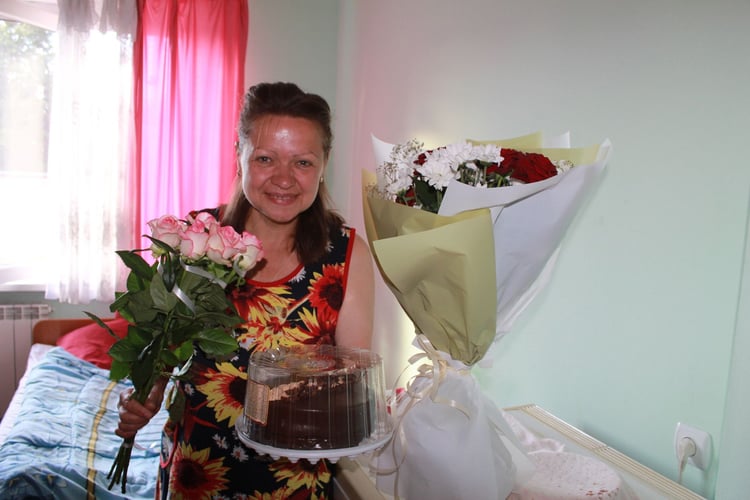
Finally, he asks not to forget about prisoners of war. In particular, the Azov fighters, who are the most difficult to exchange. He says that for them it is not a prison, but a concentration camp.
Fight for them the way we fought for you. Because we are their only voice. There is no one there to help them — neither the UN, nor the Red Cross. We are their voice.Borys Kolesnikov, police officer and defender of Mariupol
- Share:
